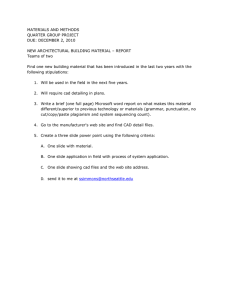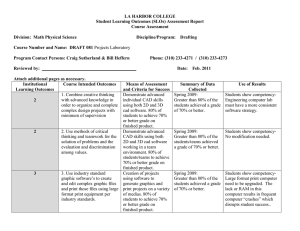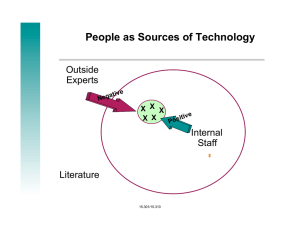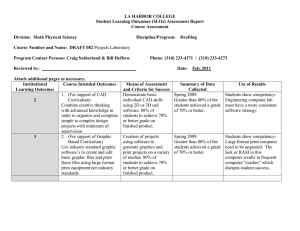Unified Computer-Aided Dispatch Functional Requirements
advertisement
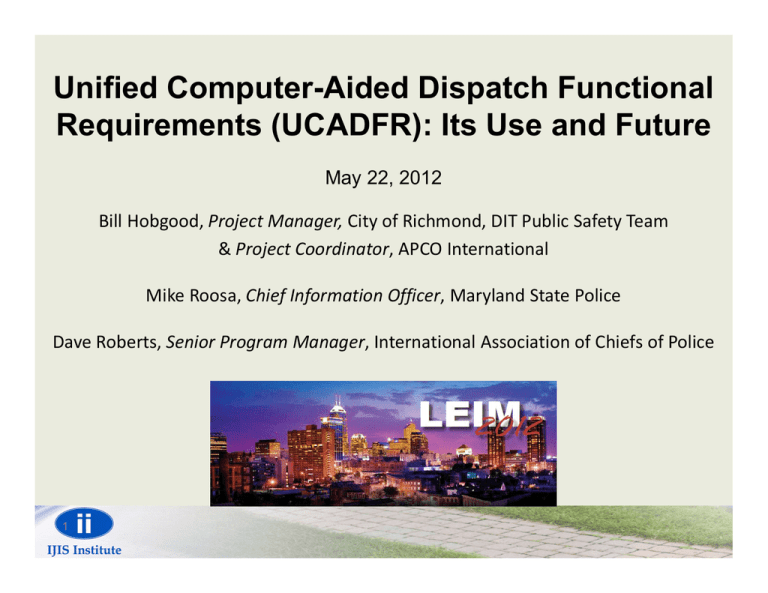
Unified Computer-Aided Dispatch Functional Requirements (UCADFR): Its Use and Future May 22, 2012 Bill Hobgood, Project Manager, City of Richmond, DIT Public Safety Team & Project Coordinator, APCO International Mike Roosa, Chief Information Officer, Maryland State Police Dave Roberts, Senior Program Manager, International Association of Chiefs of Police 1 Agenda PSDI Projects Background Current UCAD Deliverables UCADFR Why a Standard? The Development Process A Look at the Draft Standard Other Project Deliverables Future Projects PSDI Program Purpose To advance information exchange within the local communication center and first responder communities Emergency Communications Law Enforcement Fire EMS Emergency Management Transportation Others PSDI Projects 2003‐2006, LEITSC (IACP, NOBLE, NSA, PERF) Standard Functional Specifications for Law Enforcement CAD and RMS Systems PSDI Projects 2005‐2009, IJIS Institute Intelligent Transportation Systems / Public Safety Information Exchange Project (ITS/PS) 12 Exchanges Laboratory Validation; Pilot; Outreach; NISS Readiness; Lessons Learned; Project Recommendations PSDI Projects 2007‐2010, IJIS Institute & APCO Public Safety Data Interoperability (PSDI) ASAP Exchange Upgrade (NIEM) Outreach; Lessons Learned; Project Recommendations Funding Proposal In 2010, the IJIS Institute & APCO submitted a proposal to BJA for the Unified CAD Specifications Project LEITSC’s CAD Functional Specifications PSDI’s Revision Assessment … it was awarded in September 2010. Unified CAD Functional Requirements (UCADFR) PSDI Projects 2010‐2012, IJIS Institute & APCO Unified CAD Specifications Project (UCAD) BJA Grant # 2010-DB-BX-K147 ASAP Exchange Upgrade (Video) Outreach; APCO ANS Process for UCADFR; Lessons Learned; Project Recommendations UCAD Project ‐ Detail Industry James Dundas, Northrup Grumman Matthew Schreiner, Motorola Henry Unger, Hitech Systems, Inc. Communications Peggy Fouts, Grays Harbor Comm., WA Jerry Schlesinger, City of Portland, OR Lance Terry, City of Norman, OK EMS Karen Jacobson, NEMSIS Chris Kummer, Hennepin EMS, MN Greg Mears, MD, NC EMS & Univ. of NC Fire Services Evan Bestland, Palm Beach Co. Fire Rescue, FL Donald Bowers, Fairfax Co. Fire & Rescue, VA Daniel Stilwell, Seattle Fire Department, WA Dennis Wood, Prince George’s Co. Fire/EMS, MD Law Enforcement Bret Crook, City of Woodway TX Norine Plett, LA Co. Sheriff, CA Dave Roberts, IACP Mike Roosa, Maryland State Police Project Management Team Bill Hobgood, APCO & City of Richmond VA Paul Holcombe, IJIS Institute Randy Kent, IJIS Institute Scott Parker, IJIS Institute Chris Traver, Bureau of Justice Assistance Steve Wisely, APCO Status of UCADFR APCO ANS Maintenance Publish APCO ANS Process / Public Review BJA Approval Final Review (Project) Final Review (Project) Feedback Reconciliation External Review (29 Orgs) Edited and Filled in Gaps Formed 3 work groups Solidified Function List Format & changed to “Functional Requirements” Adoption of LEITSC CAD Functional Specifications & PSDI Revision Assessment External Review: Requested Organizations (representative sample) – American Ambulance Association (AAA) – Association of Public‐Safety Communications Officials‐International (APCO) – IJIS Institute’s IJIS Public Safety Technology Standards Committee (IPSTSC) – International Association of Chiefs of Police (IACP) – International Association of Emergency Medical Service Chiefs (IAEMSC) – International Association of Fire Chiefs (IAFC) – International Association of Fire Fighters (IAFF) – Major City Chiefs (MCC) – National Association of State EMS Officials (NASEMSO) – National Emergency Number Association (NENA) – National Fire Protection Association (NFPA) – National Organization of Black Law Enforcement Executives (NOBLE) – National Sheriff’s Association (NSA) – Police Executive Research Forum (PERF) A Look at the Draft UCADFR Document What are we standardizing? The UCADFR, once made into an American National Standard, will standardize a “Master List” of CAD Functions … as a reference for Practitioners and Industry. The UCADFR will NOT standardize which functions need/should be in a CAD System! Relevance Matrix (LEITSC) Requirements from the Functional Specifications for Law Enforcement Computer Aided Dispatch (CAD) Systems Law Enforcement Business Function: Law Enforcement Dispatch Call Taking Dispatch Decision Support BOLO Dispatch Units Unit Status Management Call Management Supplemental Resources Tracking Call Disposition Business Function: CAD System Administration Geofile Maintenance Security Logging Configuration Table Maintenance Communication Center Relocation CAD Catch‐Up Business Function: Support Services BOLO Emergency Operations Center Business Function: Call Management and Management Reporting Dispatch Supervisor Support CAD Management Reporting Training and Testing Business Function: Interfaces Primary Additional Interfaces Locational Systems Interfaces Administration Interfaces Communications Interfaces Public Awareness Messaging Emergency Operations Interface Additional Business Functions Fire EMS X X X X X X X X X X X X X X X X X X X X X X X X X X X X X X X X X X X X X X X X X X X X X X X X X X X X X X X X X X X X X X X X X X X X X X X X X X X X X X X X Relevance Matrix (Revision) Law Enforcement REQUIREMENTS FROM THE REVISION ASSESSMENT FOR THE INCORPORATION OF FIRE AND EMS FUNCTIONS INTO THE LAW ENFORCEMENT CAD FUNCTIONAL SPECIFICATIONS Add Destination Locations Alerting Move Up (“Fill‐In” and “Station Fill”) Staffed versus Unstaffed Units Cross‐Staffing/Crew Counting/Shared Staffing System Status Management (Dynamic Resource Deployment) Station Dispatch (versus Unit Dispatch) Run Cards/Response Plans Adjustable Dispatch Levels Adjustable Response Plans Hospital Status/Availability and Hospital Recommendation Additional Attributes CAD Incident Type Unit Recommendation Based on Input from Other Jurisdictions Predetermined and User Defined Timers Unit Status Timers Patient Tracking Additional Unit Status Strike Team/Task Force Designations Unit Rotation (aka Unit Load Balancing) Conditional Availability of Apparatus Ability to Route to a “Decision Dispatcher” Linking an Audio File to the CAD Dispatch Record Rostering Mileage Tracking Hydrant Location and Status Additional Unit Dispositions Exception Reason Tracking Add Next Generation Functions Multiple Simultaneous Calls to Single Unit X X X X X X X X X X X X X X X X X Fire EMS X X X X X X X X X X X X X X X X X X X X X X X X X X X X X X X X X X X X X X X X X X X X X X X X X X X X X X X X X Relevance Matrix (Revision‐Cont’d) Notifications Contact List Scheduled Events Special Dispatch Areas EMD/Call Triage Premises Information/Hazards Public Safety Flight Tracking Channel Designations Suspicious Activity Reporting Functionality Geo‐fencing Communications Center Standard Operating Procedures Incident/Premises/Unit Standard Operating Procedures Snapshot/Incident Replay Pre‐Release or Pre‐Alerting Remote Access Integration/Interfaces with Other Systems CAD Workstation‐to‐CAD Workstation Messaging Secondary Incident Location Vehicle/Unit Change Automatic Routing Scheduling Incident Command Support Single Discipline Call to a Combined Discipline Call Narrative Field “Shorthand” (Auto Text) Command Line/GUI Time Stamps Bypassed Units Post Dispatch Response Re‐evaluation Unit Status Transition Matrix Law Enforcement X X X X X X X X X X X X X X X X X X X X X X X X X X X X X Fire X X X X X X X X X X X X X X X X X X X X X X X X X X X X EMS X X X X X X X X X X X X X X X X X X X X X X X X X X X X A Look at the Draft UCADFR Document – Example Function #1 A Look at the Draft UCADFR Document – Example Function #1 A Look at the Draft UCADFR Document ‐ Example: Function #2 Other Potential Future Unified Initiatives 1) Unified RMS Functional Requirements / Standard 2) Unified Mobile Computing Functional Requirements / Standard – – – – – – – Unified Field Reporting Field Interview Automated Accident Reporting UCR/NIBRS (Uniform Crime Reporting/National Incident Based Reporting System) ePCR (Electronic Patient Care Reporting) NFIRS (National Fire Incident Reporting System) Inspection/Permitting 3) APIs for LTE 4) NG9‐1‐1 EIDD ‐ Emergency Information Data Document 5) ASAP – Automated Secure Alarm Protocol (was External Alarm Interface) Questions? Bill Hobgood, Co‐Project Manager, UCAD Project APCO International: hobgoodb@apcointl.org (804) 646‐5140
